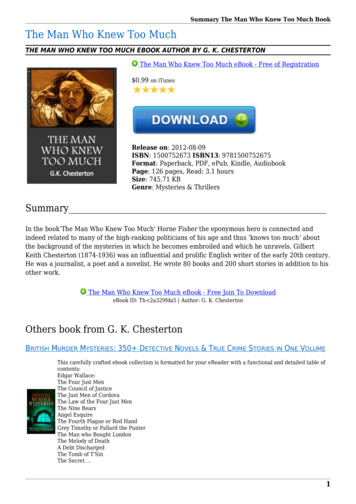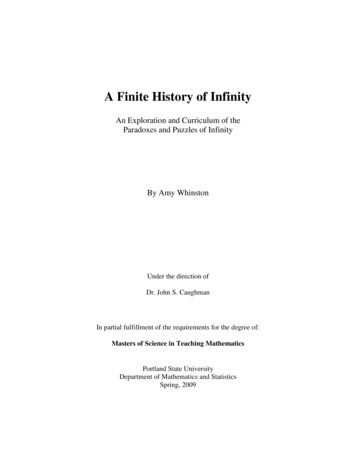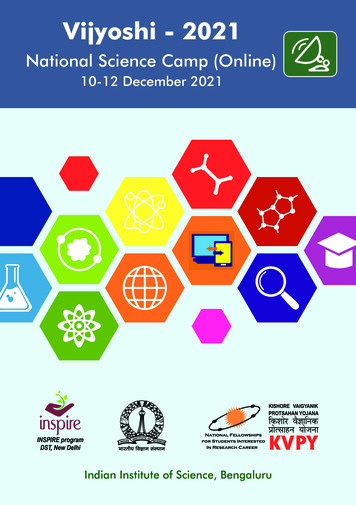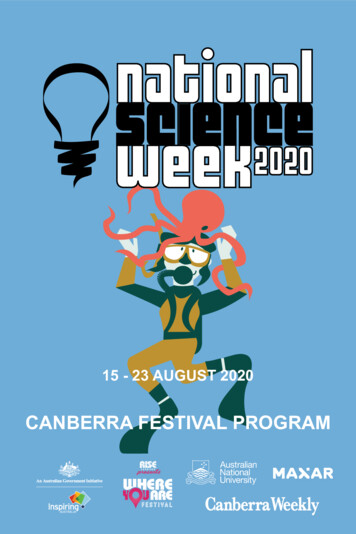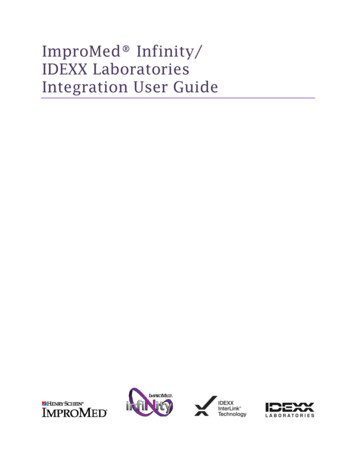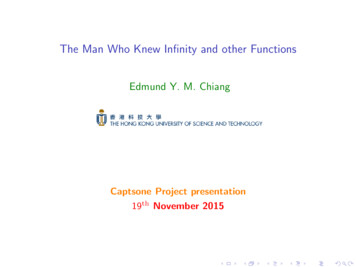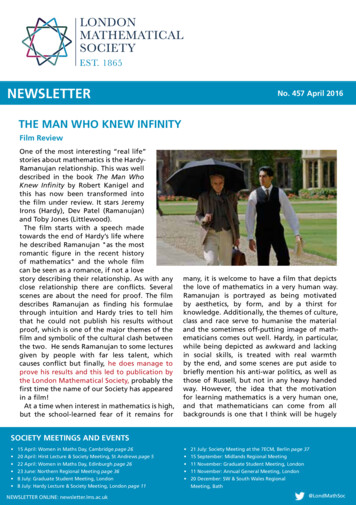
Transcription
NEWSLETTERNo. 457 April 2016THE MAN WHO KNEW INFINITYFilm ReviewOne of the most interesting “real life”stories about mathematics is the HardyRamanujan relationship. This was welldescribed in the book The Man WhoKnew Infinity by Robert Kanigel andthis has now been transformed intothe film under review. It stars JeremyIrons (Hardy), Dev Patel (Ramanujan)and Toby Jones (Littlewood).The film starts with a speech madetowards the end of Hardy’s life wherehe described Ramanujan "as the mostromantic figure in the recent historyof mathematics" and the whole filmcan be seen as a romance, if not a lovestory describing their relationship. As with anyclose relationship there are conflicts. Severalscenes are about the need for proof. The filmdescribes Ramanujan as finding his formulaethrough intuition and Hardy tries to tell himthat he could not publish his results withoutproof, which is one of the major themes of thefilm and symbolic of the cultural clash betweenthe two. He sends Ramanujan to some lecturesgiven by people with far less talent, whichcauses conflict but finally, he does manage toprove his results and this led to publication bythe London Mathematical Society, probably thefirst time the name of our Society has appearedin a film!At a time when interest in mathematics is high,but the school-learned fear of it remains formany, it is welcome to have a film that depictsthe love of mathematics in a very human way.Ramanujan is portrayed as being motivatedby aesthetics, by form, and by a thirst forknowledge. Additionally, the themes of culture,class and race serve to humanise the materialand the sometimes off-putting image of mathematicians comes out well. Hardy, in particular,while being depicted as awkward and lackingin social skills, is treated with real warmthby the end, and some scenes are put aside tobriefly mention his anti-war politics, as well asthose of Russell, but not in any heavy handedway. However, the idea that the motivationfor learning mathematics is a very human one,and that mathematicians can come from allbackgrounds is one that I think will be hugelySOCIETY MEETINGS AND EVENTS 15 April: Women in Maths Day, Cambridge page 26 21 July: Society Meeting at the 7ECM, Berlin page 37 20 April: Hirst Lecture & Society Meeting, St Andrews page 5 15 September: Midlands Regional Meeting 22 April: Women in Maths Day, Edinburgh page 26 11 November: Graduate Student Meeting, London 23 June: Northern Regional Meeting page 36 11 November: Annual General Meeting, London 8 July: Graduate Student Meeting, London 20 December: SW & South Wales Regional 8 July: Hardy Lecture & Society Meeting, London page 11NEWSLETTER ONLINE: newsletter.lms.ac.ukMeeting, Bath@LondMathSoc
LMS NEWSLETTERhttp://newsletter.lms.ac.ukContentsNo. 457 April 201662AwardsAbel Prize 2016.16Cecil King Travel Scholarship.18Clay Research Fellows 2016.8Calendar of Events42LMS ItemsCouncil Diary.14Funding for UndergraduateMathematical Society Meetings.15LMS Grant Schemes.13Hardy Lecture Tour.27LMS Library at UCL.12LMS MeetingsDavid Crighton Lecture.17Hardy Lecture & Society Meeting.11Hirst Lecture.2LMS Gresham College Lecture.28LMS Research School, QUB.29Northern Regional Meeting& Workshop.36Society Meeting at 7ECM Berlin.37Women in Maths Day.26MeetingsBayesian Methods for Networks.34BSDEs.31Combinatorics at Oxford.30Computational and AnalyticProblems in Spectral Theory.30Data Linkage and Anonymisation.35ECSTATIC 2016.33Graph Limits and Statistics.34Groups St Andrews 2017.32Modelling, Analysis and Simulation.3322Modern Topics in Nonlinear PDE andGeometric Analysis.4Postgraduate Group TheoryConference.33Quantum Physics and Logic.30Random Interacting Systems.31Representation Theory of AlgebraicGroups.32Scottish Partial DifferentialEquations Colloquium. 30NewsChalkdust.10European News.9Mathematics Policy Round-up.7Mathematical Sciences ResearchDisplayed in Parliament.6Heilbronn Institute.10Voice of the Future.7ReportsFrom Symbolic Dynamics toApproximation Methods.20Integrable Systems in Newcastle.23Mirzakhani Society.22Why be Noncommutative?.22ReviewsExperimental Mathematics.38The Geometry of the Octonions.40The Man Who Knew Infinity.1VisitsHou, Yong.24Kuna, Tobias.25Lin, Jyun-Ao.24Lomp, Christian.24Scott, Dana.25
newsletter@lms.ac.ukNo. 457 April 2016resonant for audiences, as it has been withthe interest in Turing in recent years.One problem about any film about mathematics is how much of our subject toinclude. Any detail would put the generalaudience off. Here they get it about right,and some praise must surely go to Ken Ono,who was the mathematical advisor for thefilm. Of course, there are many formulaeshown but these can be seen as mathematical wallpaper. They do describe the partitionfunction p(n) and actually show that p(4) 5but this should be accessible to everyone.One point of comparison would be thefilm Good Will Hunting, which also depicteda – this time fictional – mathematical genius,and was received fairly positively. I think itfair to say that while that film had a lot ofcharm, this fim outshines Good Will Huntingin almost every way. The cultural gap is somuch more acute and the historical foundation makes all elements of the film moregrounded; from the characters, to the wayit presents mathematics to the backdropof the First World War. Most of all it ismore uplifting, embracing the positivity ofromance, albeit a platonic romance rootedin a love of mathematics.The filming is quite beautiful, both inIndia and in Cambridge. They were allowedto actually film in Trinity College! Manywell-known mathematicians are characters.Besides Hardy and Ramanujan we meetLittlewood, Russell and Major MacMahon.A nice scene is a discussion betweenMacMahon and Ramanujan concerningthe partition function. At first, MacMahondoubts whether Ramanujan’s formula forp(n) could be correct. MacMahon hadcomputed p(200) by hand and then foundthat the analytic formula turned out to givean extremely accurate answer. MacMahonchanged his mind!Earlier in the film Ramanujan failed to beelected a fellow of Trinity and racism playeda part here. Towards the end of the film,Hardy proposed that Ramanujan become anFRS and in a moving speech, he persuadedthe other fellows to elect him. During hisstay in Cambridge, Ramanujan develops tuberculosis and goes back to India where hedies at the age of 32.The acting throughout is first class. JeremyIrons is outstanding as Hardy and he evenlooks like him. Dev Patel is convincing asRamanujan. Unfortunately, he doesn’t looklike him; Ramanujan was short and fatwhereas Patel is quite tall. We particularlyliked Toby Jones as Littlewood, providingsome of the lighter moments. In short, thisis perhaps the best film about mathematicsever made!Armando Martino and David SingermanUniversity of SouthamptonThe Man Who Knew Infinity will be released in theUK on 8 April and in the US on 29 April.Editorial teamPublication dates and deadlineshttp://newsletter.lms.ac.ukEditorial officeLondon Mathematical Society,De Morgan House, 57–58 RussellSquare, London WC1B 4HS(t: 020 7637 3686;f: 020 7323 3655)General EditorMr A.J.S. Mann(a.mann@gre.ac.uk)Events calendarUpdates and corrections tocalendar@lms.ac.ukReviews EditorProfessor D. Singerman(d.singerman@soton.ac.uk)ArticlesSend articles tonewsletter@lms.ac.ukAdministrative EditorS.M. Oakes(newsletter@lms.ac.uk)AdvertisingFor rates and guidelines seenewsletter.lms.ac.uk/rate-cardTypeset by the LMS at DeMorgan House; printed byHolbrooks Printers Ltd.Reports EditorProfessor I. A. Stewart(i.a.stewart@durham.ac.uk)Published monthly, except August. Items and advertisements by the first day of the month prior to publication, or the closest preceding working day. Noticesand advertisements are not accepted for events thatoccur in the first week of the publication month.News items and notices in the Newsletter may befreely used elsewhere unless otherwise stated, although attribution is requested when reproducingwhole articles. Contributions to the Newsletter aremade under a non-exclusive licence; please contactthe author or photographer for the rights to reproduce. The LMS cannot accept responsibility for theaccuracy of information in the Newsletter. Viewsexpressed do not necessarily represent the views orpolicy of the London Mathematical Society.Charity registration number: 252660.3
LMS NEWSLETTER4http://newsletter.lms.ac.uk
newsletter@lms.ac.ukNo. 457 April 2016Inaugural Hirst Lecture & SocietyMeetingSt Andrews, 20 April 20163.30 pm:Opening of the meeting3.45 pm:Mark McCartney (Ulster)Title TBA4.45 pm:Tea5.15 pm:Hirst Lecture, Edmund Robertson (St. Andrews)Title TBA6.15 pm:Meeting closes. Wine reception.The Inaugural Hirst Lecture & Society Meeting celebrates the joint award of theHirst Prize & Lectureship, in the 150th Anniversary year of the London MathematicalSociety, to Professor Edmund Robertson (St. Andrews) and the Dr John O’Connor (St.Andrews) for their creation, development and maintenance of the MacTutor Historyof Mathematics web site.The prize and lectureship are named after Thomas A. Hirst, 5th President of theLondon Mathematical Society from 1872-1874. The prize is awarded in recognitionof original and innovative work in the history of mathematics, which may be in anymedium.These lectures are aimed at a general audience. All interested, whether LMS membersor not, are most welcome to attend this event. For further details and to registerplease email lmsmeetings@lms.ac.ukThere are funds available to contribute in part to the expenses of members of theSociety or research students to attend the meeting and workshop. Requests forsupport, including an estimate of expenses, may be addressed to Elizabeth Fisher(lmsmeetings@lms.ac.uk).1865 - 20155
NewsLMS NEWSLETTERhttp://newsletter.lms.ac.ukMathematical Sciences ResearchDisplayed in Parliament6Three mathematicians won medals and awardsat a competition in the House of Commons onMonday 7 March 2016 for the excellence oftheir mathematical science research, walkingaway with a 3,000, 2,000 and 1,000 prizefor Gold (sponsored by the Clay MathematicsInstitute), Silver and Bronze (sponsored by theBank of England) respectively.Dr Philip Pearce (University of Manchester),Dr Tom Montenegro-Johnson (University ofCambridge) and Weijian Zhang (Universityof Manchester) each presented research todozens of politicians and a panel of expertjudges as part of the poster competition SETfor Britain.Dr Philip Pearce was awarded Gold for hisresearch on building a virtual placenta, DrTom Montenegro-Johnson won Silver forhis research on microrobotic swimming andWeijian Zhang won Bronze for his researchon time-dependent network modelling formining scientific literature.The three winners were judged against 29other shortlisted mathematicians and cameout on top.Sir Adrian Smith, Chair of the Council forthe Mathematical Sciences (CMS) said: ‘TheCMS is delighted, once again, to showcasethe importance of the mathematical sciencesto a wider audience. It is paramount toencourage early-career research scientists,engineers, technologists and mathematicians and the SET for Britain event is a veryeffective way of doing this. We have been encouraged by the enthusiastic response fromearly-career researchers in the mathematicalsciences and feel sure this will this continuein the future’.Stephen Metcalfe MP, Chairman of the Parliamentary and Scientific Committee, said:‘This annual competition is an importantdate in the parliamentary calendar because itgives MPs an opportunity to speak to a widerange of the country’s best young research-(l to r) Dr Stephen Benn (Royal Society of Biology), Sylaja Srinivasan (Bank of England), Professor Nick Woodhouse(Clay Mathematics Institute), Weijian Zhang (Bronze Award Winner), Dr Philip Pearce (Gold Award Winner),Dr Tom Montenegro-Johnson (Silver Award Winner), Professor Sir Adrian Smith (CMS), Stephen Metcalfe MP
newsletter@lms.ac.ukers. These early career engineers, mathematicians and scientists are the architects of ourfuture and SET for Britain is politicians’ bestopportunity to meet them and understandtheir work’.The Parliamentary and Scientific Committeeruns the event with support from the RoyalAcademy of Engineering, the Royal Societyof Chemistry, the Institute of Physics, theNo. 457 April 2016Royal Society of Biology, The PhysiologicalSociety and the Council for the MathematicalSciences.The event was made possible this year bythe prize sponsors, who are Essar, the ClayMathematics Institute, Warwick Manufacturing Group (WMG), the Institute of BiomedicalScience, the Bank of England and the Societyof Chemical Industry.VOICE OF THE FUTURE 2016The Council for Mathematical Sciences (CMS)once again sent young mathematical scientists tothis year’s Voice of the Future event. The event isan opportunity for scientists aged 16-35 to puttheir questions to an assembled panel of MPs atthe House of Commons. The event, organisedby the Society of Biology, took place at PortcullisHouse on Tuesday 1 March 2016.This year’s CMS nominated participants wereRosanna Cretney (Open University), Ellen Dowie(University of Kent), Hannah Muit (Ernst &Young) and Maria Sudell (University of Liverpool).MPs attending the event included the Ministerfor Universities and Science, Jo Johnson MP;Shadow Minister for Science, Yvonne FovargueMP; Nicola Blackwood MP and members of theHouse of Commons Select Committee for Science& Technology; and Sir Mark Walport the Government Chief Scientific Adviser. A video messagewas also received from Tim Peake aboard theInternational Space Station.More information about the event is availableat of-the-future. The event was alsobroadcast on Parliament TV http://tinyurl.com/zcpgtmj.MATHEMATICS POLICY ROUND-UPMarch 2016HIGHER EDUCATIONBIS Committee publishes assessing qualityin HE reportThe Business, Innovation and Skills SelectCommittee has published its report The Teaching Excellence Framework:Assessing quality in Higher Education. ‘TheCommittee supports the Universities Minister’s desire to improve teaching qualityat universities, widen participation, andincrease the focus on graduate employability but the Committee’s report recognisesgenuine concerns about the implementation of the new teaching framework andthe pace of its introduction’. The fullreport is available at http://tinyurl.com/h6xavd8.RESEARCHConsultation on Mathematics for Horizon2020The European Commission has launchedan open consultation on Mathematics inH2020. The objective is to collect a largequantity of concrete proposals that cansubsequently be used to inform the futurework programmes (2018-19-20) with innovative mathematical content. The consultation is open until 30 April 2016. More information is available at http://tinyurl.com/h8n6xt2.7
NewsLMS NEWSLETTERSCHOOLS AND COLLEGESOECD ReportA report published by OECD - Low-performing Students: Why they Fall Behind andHow to Help them Succeed - examines lowperformance at school by looking at lowperformers’ family background, educationcareer and attitudes towards school. Thereport also analyses the school practices andeducational policies that are more stronglyassociated with poor student performance.The evidence provided in the report revealswhat policy makers, educators, parents andstudents themselves can do to tackle lowperformance and succeed in school. More information is available at http://tinyurl.com/gu6ba48.Tough Choices Report8Your Life has launched a report titled - ToughChoices: The real reasons A-level studentsare steering clear of science and maths.http://newsletter.lms.ac.ukThe skills gap is set to grow not diminish,demonstrating that huge challengesremain. This report aims to help inspirechange by providing an insight intostudents’ thinking and the choices theyface. The report looks at the decision-making process of those students that chooseto move away from science and mathematics before A-level. The full report isavailable at http://tinyurl.com/gshcqmk.OTHERNew Director General Business andScienceGareth Davies has been appointed to therole of Director General for Business andScience, at the Department for Business,Innovation and Skills (BIS). More information is available at http://tinyurl.com/za89jwd.Dr John JohnstonJoint Promotion of MathematicsCLAY RESEARCH FELLOWS 2016The Clay Mathematics Institute is pleasedto announce that Simion Filip and TonyYue Yu have been appointed Clay ResearchFellows.Simion Filip willreceive his PhD inJune 2016 fromthe University ofChicago under thesupervision of AlexEskin. Simion is interested in the connectionsbetweendynamical systemsand algebraic geometry, in particularbetween Teichmüller dynamics and Hodgetheory. His recent interests also involve K3surfaces and their special geometric properties. Simion has been appointed as a ClayResearch Fellow for a term of five yearsbeginning 1 July 2016.Tony Yue Yu receivedhis PhD in 2016 fromUniversité Paris Diderotunder the supervision ofMaxim Kontsevich andAntoine Chambert-Loir.Tony works on nonarchimedean geometry,tropical geometry and mirror symmetry.He aims to build a theory of enumerativegeometry in the setting of Berkovich spaces.Such a theory will give us a new understanding of the enumerative geometry of CalabiYau manifolds, as well as the structure oftheir mirrors. It is also intimately related tothe theory of cluster algebras and wall-crossing structures. Tony has been appointed as aClay Research Fellow for a term of five yearsbeginning 1 September 2016.For more information visit www.claymath.org.
newsletter@lms.ac.ukNo. 457 April 2016EUROPEAN NEWSThe following items are from the EuropeanMathematical Society (EMS) webpage www.euro-math-soc.eu/recent-news.Meeting of presidents in BudapestThe next meeting of presidents of membersocieties of the European Mathematical Society will take place in Budapest,Hungary, during the weekend 2 to 3April 2016. The meeting is hosted by theJános Bolyai Society and the Alfréd RényiInstitute of Mathematics. Among otherissues, problems of mathematical educationthroughout Europe will be a focal point forthe meeting.Crafoord PrizeThe Royal SwedishAcademy of Scienceshas awarded the2016 Crafoord Prizein Mathematics toYakovEliashberg,Stanford University,USA, “for the development of contactProfessor Yakov Eliashbergandsymplectic topology andgroundbreaking discoveries of rigidity andflexibility phenomena”. Yakov was born in1946 in St Petersburg, Russia, obtaining aPhD at Leningrad State University in 1972.He is the Herald L. and Caroline L. RitchProfessor of Mathematics at Stanford University.Turkish academics persecutedTurkish academics who have openly criticized Turkey’s military crackdown on ethnicKurdish communities are now feeling thewrath of their government. In recent daysthe government arrested 33 academics.Although all have since been released,15 have been fired from their universityposts. The course of action started on 11January, when a letter protesting violencein Turkey's ethnically Kurdish Southeast-ern region, and calling on the governmentto make peace with Kurdish rebels, wasposted online. Meanwhile, more than 2,200academics in Turkey and more than 2,300abroad signed the letter (see http://tinyurl.com/z968vqj).Horizon 2020 consultationIn 2014 the European Commissionorganized an online consultation Mathematics and Digital Science that wasfollowed up by a workshop in Brussels inNovember that same year and resulted in areport with recommendations for the incorporation of various mathematical areas andmethodologies into future programmeswithin the HORIZON 2020 programme. TheEMS participated in both the consultation and the workshop very actively. Thisyear, a similar online open consultation hasbeen started and has received a numberof reactions already. The EMS urges itsmembers (both societies and individuals) totake up the challenge and thus give mathematicians better options for applications infuture work programmes under HORIZON2020. The consultation will stay open until30 April 2016. For further information seehttp://tinyurl.com/h8n6xt2.Hermann Weyl PrizeThe 2016 Hermann Weyl Prize has beenawarded to Vasily Pestun of IHES (France)for his ground breaking results in the studyof supersymmetric gauge theories, suchas his ingenious computation of partitionfunctions that led to the discovery of richconnections between four-dimensional andtwo-dimensional quantum field theories.The award ceremony will take place duringthe International Colloquium on GroupTheoretical Methods in Physics to be heldin Rio de Janeiro, Brazil, from 19 to 25 June2016. For further information see http://icgtmp.blogs.uva.es/.David ChillingworthLMS/EMS Correspondent9
NewsLMS NEWSLETTERThe Heilbronn Institute for MathematicalResearch has just celebrated its first 10 years inoperation. It is a national institute that supportsmathematics across the UK. Its members splittheir time between their own personal researchand fundamental mathematical problemssuggested by the UK Government Communication Headquarters in Cheltenham.At any one time the Institute typically has over40 members, ranging from highly distinguishedsenior mathematicians to early career ResearchFellows; it supports over 25 postdoctoralResearch Fellowships.The Heilbronn Institute is based in Bristol andLondon. Fellows are currently hosted in sevenhttp://newsletter.lms.ac.ukUK Mathematics Departments, and this numberis set to increase. Over the past 10 years over 150mathematicians have been members, includingover 60 Research Fellows. These members havecome from more than 20 universities in the UK.As well as supporting mathematicians throughsabbatical secondments and Research Fellowships, the Institute funds a range of conferences,workshops and focused research events. Forexample, it funds an Annual Distinguished LectureSeries, which in 2016 will be given by ProfessorPeter Sarnak (IAS, Princeton), and an AnnualConference at which recent speakers includeProfessorsNaliniAnantharaman,Jean-Francois Le Gall, Bryna Kra, KristinLauter,HenrikLenstra,WendelinWerner and Don Zagier. It also supports manyother mathematical events across the UK.For more information about the work of theInstitute see heilbronn.ac.uk.10CHALKDUSTChalkdust Issue 3 is now available. It includes an interview withProfessor Ian Stewart, the legacy of Fibonacci, an article aboutfractional calculus and much more. If you would like to readyour maths-horoscope or find out what the half derivative ofa function is, you can read it online for free at www.chalkdustmagazine.com, where you can also order a printed copy ofthe magazine, read a weekly blog and subscribe to a monthlynewsletter.
newsletter@lms.ac.ukNo. 457 April 2016General Society Meeting &Hardy Lecture 2016Friday 8 July 2016JZ Young Lecture Theatre, UCL, Gower Street (nearest tube stations:Euston and Euston Square)3.304.455.15Opening of the meeting and LMS business, including the announcement of the2016 Prize winners (open to all)Tony Scholl (Cambridge)TITLE TBATea/CoffeeJacob Lurie (Harvard) – Hardy LectureWeil's Conjecture for Function FieldsAbstract: Let q be a positive definite quadratic form with integer coefficients.We saythat another such quadratic form q' is in the genus of q if, for every positive integer n, thequadratic forms q and q' differ by a change of variable when reduced modulo n. Up to achange of variables, there are only finitely many quadratic forms in a genus. Moreover, thereis a formula (the "mass formula" of Smith-Minkowski-Siegel) which counts the number ofquadratic forms within a genus.This mass formula was reformulated by Tamagawa andWeil as a statement about the volume of certain adelic homogeneous spaces for the specialorthogonal group SO(n).This led Weil to conjecture an analogous statement for the volumesof homogeneous spaces for other groups, which he verified in a number of cases and hassubsequently been proven by Langlands, Lai, and Kottwitz. In this lecture I'll describe jointwork with Dennis Gaitsgory which establishes the function field analogue of Weil's conjecture,using techniques inspired by algebraic topology6.307.30Reception at De Morgan HouseSociety Dinner to be held at VENUE TBCThese lectures are aimed at a general mathematical audience. All interested, whetherLMS members or not, are most welcome to attend this event. To register for yourplace at the meeting, please email Elizabeth Fisher (lmsmeetings@lms.ac.uk). If youwould like to attend the Society Dinner, please email Elizabeth Fisher (lmsmeetings@lms.ac.uk). The cost to attend the Society Dinner is 35.00 per person (inclusive ofwine).1865 - 201511
LMS ItemsLMS NEWSLETTERhttp://newsletter.lms.ac.ukLMS LIBRARY AT UCLRegistering, Renewing, Visiting12Members of the Society are reminded thatthey may register as users of the UniversityCollege London (UCL) Library, where theLondon Mathematical Society Library is heldand which contains a collection of: periodicals published by other mathematical societies which are received inexchange for the Society's publications copies of books and journals published bythe Society items acquired by the Society as reviewcopies or giftsThe Society’s Library is housed in the UCLScience Library. Members may also use all thematerial available in the reading rooms andstores of the UCL family of libraries. Theseprivileges include: borrowing up to ten items at any one time placing up to three concurrent reservations on material already on loan. borrowing books by post without servicecharge (costs for returning the books mustbe covered by the user) access to MathSciNet and specific electronic journals from designated terminalsin the Science Library use of the Explore access points to searchfor and view electronic publications andsave single copies of articles (no morethan one article per journal issue) for yourown personal use – you can save articles tostandard USB sticks, note that USB stickscontaining encrypted software do notwork on the Explore access points use of photocopying facilities at UCLlibraries (charged at the same rate as UCLstaff) rapid photocopying service by post - Photocopy Request and Copyright DeclarationFormFor licensing reasons, use of the Library atUCL does not include remote electronic accessto journals and articles. To check the listingsof electronic journals available to visitors,before your visit to the Library, use Explore(http://sfx.ucl.ac.uk/sfx local/az/walkin).To Register/Renew (in person)Complete the application form rm) and bring the following items with you: passport-size photograph proof of identity e.g. passport, photocarddriving licence proof of address e.g. utility bill, recentbank statement, valid photocard drivinglicence proof of membership – a letter of confirmation can be obtained from the Society– email membership@lms.ac.ukTo Register/Renew (by post)To register by post, complete the applicationform (download from www.ucl.ac.uk/library/do–cs/borrowerform) and return it with: a passport-size photograph proof of membership – a letter of confirmation can be obtained from the Society –email membership@lms.ac.ukTo: Head of Membership, UCL LibraryServices, University College London, GowerStreet, London WC1E 6BT (tel: 020 7679 7953,fax: 020 7679 7373, email: lib-membership@ucl.ac.uk).When registering by post, library cards willbe posted back to the address given on theapplication form.Library cards are valid for 12 months fromdate of issue and will need to be renewedeach year.No charge is made for the initial registration or for renewing expired library cards orcards which are within one calendar month ofexpiring.Reminders to renew - to receive remindersto renew by email from the Library at UCL,remember to include an email address onthe form when registering and renewing.The UCL Library will send out reminders twoweeks before your library card is due to expire.Forgotten cards – if you forget your librarycard, you will not be admitted to any UCLLibrary. This rule is strictly applied.
newsletter@lms.ac.ukNo. 457 April 2016Visiting the LibraryNew: checking seat availabilityYou can now check online for the availabilityof seats in the reading rooms and computercluster at the Science Library: www.ucl.ac.uk/library/sites/science/#currentNew: self-guided tourYou can now familiarise yourself with thelayout of the Science Library by viewingthe self-guided tour online: nce-selfguide.24 hour openingThe Scienc
THE MAN WHO KNEW INFINITY Film Review One of the most interesting "real life" stories about mathematics is the Hardy-Ramanujan relationship. This was well described in the book The Man Who Knew Infinityby Robert Kanigel and this has now been transformed into the filmunder review. It stars Jeremy Irons (Hardy), Dev Patel (Ramanujan)


